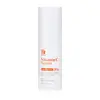What's inside
What's inside
 Key Ingredients
Key Ingredients

 Benefits
Benefits

 Concerns
Concerns

No concerns
 Ingredients Side-by-side
Ingredients Side-by-side

Propanediol
SolventAscorbic Acid
AntioxidantButylene Glycol
HumectantGlycerin
HumectantPentylene Glycol
Skin ConditioningCandida Bombicola/Glucose/Methyl Rapeseedate Ferment
AntimicrobialGlyceryl Glucoside
Humectant3-O-Ethyl Ascorbic Acid
Skin ConditioningPanthenol
Skin ConditioningAmmonium Acryloyldimethyltaurate/Vp Copolymer
Prunus Armeniaca Kernel Oil
MaskingSodium Polyacrylate
AbsorbentPolyquaternium-10
Adenosine
Skin ConditioningFerulic Acid
AntimicrobialEctoin
Skin ConditioningGlutathione
Oryza Sativa Bran Oil
EmollientTocotrienols
Skin ConditioningTocopherol
AntioxidantPropanediol, Ascorbic Acid, Butylene Glycol, Glycerin, Pentylene Glycol, Candida Bombicola/Glucose/Methyl Rapeseedate Ferment, Glyceryl Glucoside, 3-O-Ethyl Ascorbic Acid, Panthenol, Ammonium Acryloyldimethyltaurate/Vp Copolymer, Prunus Armeniaca Kernel Oil, Sodium Polyacrylate, Polyquaternium-10, Adenosine, Ferulic Acid, Ectoin, Glutathione, Oryza Sativa Bran Oil, Tocotrienols, Tocopherol
Ascorbic Acid
AntioxidantPramoxine Hydrochloride
Salicylic Acid
MaskingO-Cymen-5-Ol
AntimicrobialAscorbyl Tetraisopalmitate
AntioxidantTocopherol
AntioxidantAlpinia Zerumbet Seed Extract
AntimicrobialSerine
MaskingButylene Glycol
HumectantPropanediol
SolventIsopentyldiol
HumectantPropylene Glycol
HumectantPEG-8
HumectantDipropylene Glycol
HumectantAlcohol
AntimicrobialSodium Metabisulfite
AntioxidantHydrogenated Castor Oil
EmollientParfum
MaskingAscorbic Acid, Pramoxine Hydrochloride, Salicylic Acid, O-Cymen-5-Ol, Ascorbyl Tetraisopalmitate, Tocopherol, Alpinia Zerumbet Seed Extract, Serine, Butylene Glycol, Propanediol, Isopentyldiol, Propylene Glycol, PEG-8, Dipropylene Glycol, Alcohol, Sodium Metabisulfite, Hydrogenated Castor Oil, Parfum
 Reviews
Reviews

Ingredients Explained
These ingredients are found in both products.
Ingredients higher up in an ingredient list are typically present in a larger amount.
Ascorbic Acid is is pure Vitamin C. This form makes up the largest amount of vitamin C found naturally in our skin.
Not only is vitamin C great for your overall health and immune system, it also has plenty of benefits on your skin.
Vitamin C is best used for brightening skin. It improves dark spots, acne scars, and hyperpigmentation. This is because it blocks the process of skin darkening when exposed to UV.
Remember: Vitamin C should not replace sunscreen!
Your skin uses vitamin C to build collagen. Collagen is one key component in having a strong skin barrier and plump skin. Vitamin C also plays a role in regulating collagen, thus making it effective in improving wrinkles and fine lines.
Ascorbic acid shows potent antioxidant activity. As an antioxidant, it helps fight free-radicals. Free-radicals are molecules that may damage your skin cells. These antioxidants also protect skin against UV damage.
The best formulations include Vitamin E and/or ferulic acid. These two ingredients help stabilize and provide a boost in the benefits of ascorbic acid. This is because ascorbic acid becomes unstable when exposed to UV and air. In fact, you can tell your ascorbic acid has oxidized when it turns an orange-yellow color.
Ascorbic acid is generally compatible with other ingredients. However, using ascorbic acid with other active ingredients might cause irritation. Two ingredients: copper ions and benzoyl peroxide, will inactivate ascorbic acid completely.
Read more about other types of Vitamin C:
Foods rich with vitamin C include oranges, strawberries, broccoli, bell peppers, and more. When consuming Vitamin C, your skin receives a portion of the nutrients.
Learn more about Ascorbic AcidButylene Glycol (or BG) is used within cosmetic products for a few different reasons:
Overall, Butylene Glycol is a safe and well-rounded ingredient that works well with other ingredients.
Though this ingredient works well with most skin types, some people with sensitive skin may experience a reaction such as allergic rashes, closed comedones, or itchiness.
Learn more about Butylene GlycolPropanediol is an all-star ingredient. It softens, hydrates, and smooths the skin.
It’s often used to:
Propanediol is not likely to cause sensitivity and considered safe to use. It is derived from corn or petroleum with a clear color and no scent.
Learn more about PropanediolTocopherol (also known as Vitamin E) is a common antioxidant used to help protect the skin from free-radicals and strengthen the skin barrier. It's also fat soluble - this means our skin is great at absorbing it.
Vitamin E also helps keep your natural skin lipids healthy. Your lipid skin barrier naturally consists of lipids, ceramides, and fatty acids. Vitamin E offers extra protection for your skin’s lipid barrier, keeping your skin healthy and nourished.
Another benefit is a bit of UV protection. Vitamin E helps reduce the damage caused by UVB rays. (It should not replace your sunscreen). Combining it with Vitamin C can decrease sunburned cells and hyperpigmentation after UV exposure.
You might have noticed Vitamin E + C often paired together. This is because it is great at stabilizing Vitamin C. Using the two together helps increase the effectiveness of both ingredients.
There are often claims that Vitamin E can reduce/prevent scarring, but these claims haven't been confirmed by scientific research.
Learn more about Tocopherol